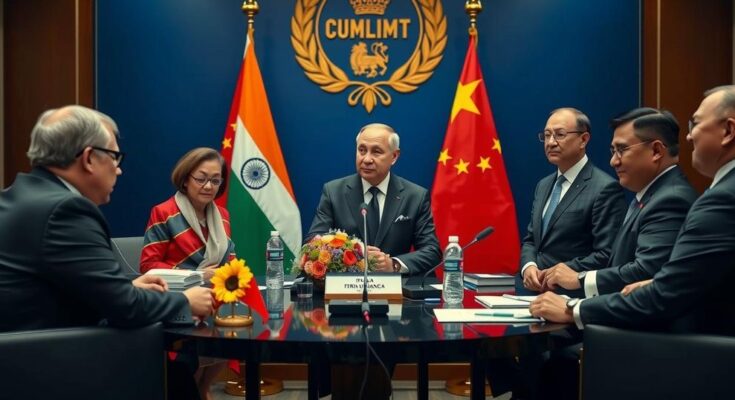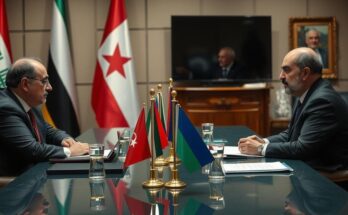During a summit in Kazan, Russian President Vladimir Putin welcomed leaders from BRICS nations, including Indian Prime Minister Narendra Modi and Chinese President Xi Jinping, who emphasized the need for a peaceful resolution to the Ukraine conflict and reaffirmed their support for Russia. The gathering signifies an attempt by Moscow to project an image of global partnership despite facing isolation from the West, while also addressing key economic and geopolitical issues within the group.
At a significant summit held in Kazan, Russia, Indian Prime Minister Narendra Modi emphasized the urgency of resolving the Ukraine conflict in discussions with President Vladimir Putin. During the meeting, Modi expressed India’s commitment to a peaceful resolution and support for restoring stability. Chinese President Xi Jinping also reaffirmed his nation’s strong ties with Russia, describing them as a powerful partnership within a “chaotic” global landscape. The gathering, which includes approximately 20 world leaders, serves to bolster Putin’s narrative of global support despite Western efforts to isolate Russia due to its actions in Ukraine. Modi, who has been navigating a complex diplomatic path since the commencement of hostilities, highlighted his nation’s commitment to facilitating dialogue for peace. South African President Cyril Ramaphosa similarly characterized Russia as a “valued ally,” reflecting South Africa’s historical ties with Moscow dating back to its anti-apartheid struggles. While the summit is considered a means for Russia to demonstrate that it remains a significant player on the world stage, it also coincides with rising concerns regarding Russia’s strengthening alliances with countries such as China and Iran. Additionally, key discussions are anticipated regarding financial systems that could challenge existing Western-dominated platforms. Amid this backdrop, the Kremlin’s efforts appear directed towards asserting its geopolitical relevance and signaling the formation of a multipolar world order, as articulated by political analysts.
The BRICS group, comprising Brazil, Russia, India, China, and South Africa, was established to foster cooperation among emerging economies. The recent summit in Kazan comes at a time of heightened geopolitical tensions following Russia’s invasion of Ukraine. As Western nations impose sanctions on Russia, leaders from India and South Africa are attempting to navigate their diplomatic relationships, balancing support for Moscow while advocating for peace in Ukraine. Modi’s dual approach of humanitarian support for Ukraine and calls for dialogue is indicative of India’s strategy to position itself as a potential mediator. The summit aims to showcase unity among BRICS nations and counter the narrative of Russia’s international isolation.
In conclusion, the Kazan summit underscores the persistent bonds among BRICS leaders, particularly in the context of supporting Russia amidst ongoing geopolitical strife. Modi’s call for a swift resolution to the Ukraine conflict, combined with Xi’s affirmation of China’s robust ties with Russia and Ramaphosa’s historic acknowledgment of Russian support, indicates a concerted effort among these nations to underscore their solidarity against perceived Western hegemony. As dialogues unfold around potential alternative financial systems and global stability, the dynamics within BRICS remain complex and fraught with the nuances of international relations.
Original Source: www.courthousenews.com




